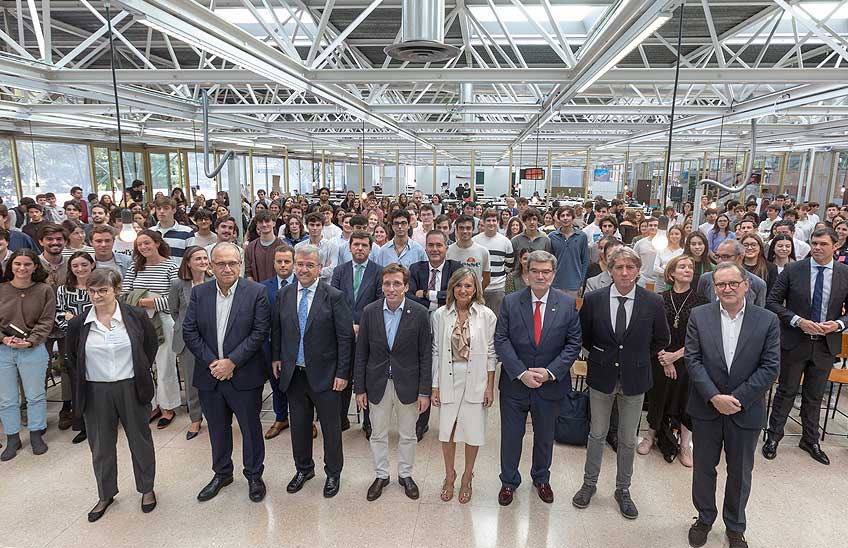"We mayors are the Spain that is possible, capable of talking to each other," says Martínez-Almeida.
The mayors of Madrid, Bilbao, Estepona and Soria, and the mayoress of Pamplona, in a congress held at the University

FotoManuelCastells/In the front row, from left to right, Julia Urabayen, professor at School of Philosophy y Letras and president of association of Philosophy y Ciudad; Enrique Maya, former mayor of Pamplona; José Mª García Urbano, mayor of Estepona; José Luis Martínez Almeida, mayor of Madrid; Cristina Ibarrola, Mayor of Pamplona; Juan Mª Aburto, Mayor of Bilbao; Carlos Martínez Mínguez, Mayor of Soria; and Carlos Naya, director of the School of Architecture, together with those attending the roundtable held at the University of Navarra, on the occasion of the congress Philosophy and City.
18 | 10 | 2023
"We mayors are the possible Spain, capable of talking to each other; all cities have common problems and we can collaborate". This was stated today at the University of Navarra by the Mayor of Madrid, José Luis Martínez-Almeida, during the III International congress "Philosophy and City", organized by the academic center and association Philosophy and City.
Martínez-Almeida intervened in a roundtable on "The government of cities", together with the mayors Juan María Aburto (Bilbao), José María García Urbano (Estepona) and Carlos Martínez Mínguez (Soria); and the mayoress Cristina Ibarrola (Pamplona). The architect and former mayor of Pamplona, Enrique Maya, moderated the session at work. Among other issues, the mayors addressed topics such as urban agendas, immigration, the new mobility, and housing and urban regeneration.
With respect to urban agendas, the Mayor of Madrid stated that "the premise on which society grows is people, it is human talent, and this must be the center of all decisions. We must be capable of providing solutions, we cannot solve humanity's problems, but we do have the capacity to improve the quality of life".
Juan Mari Aburto also referred to security as a fundamental element of this diary, since society after the pandemic "is much more individualistic," he said. For her part, Cristina Ibarrola, mayor of Pamplona, pointed out that a clear perception of the city model is necessary: "The urban diary allows you to have a joint and consensual vision between different municipal groups". Likewise, according to the mayor of Estepona, these forums "are helping to consolidate Europe" and the mayor of Soria stated that they are useful, because they force the development of a planning of city models, as well as "having a direct relationship with the citizens".
Immigration: necessity and opportunity
Regarding immigration, Mayor Martínez-Almeida pointed out that it is necessary and very beneficial for Spain and that we should not be afraid "of cultural, social and religious diversity". At the same time, he stressed that "it is not fair to identify immigration with crime" and that when speaking of illegal immigration "we should not fall into populism". Cristina Ibarrola agreed with him, who said that cities must show solidarity, as it is a moral obligation, but also a necessity. "We will not be able to support pension levels and other issues if we do not incorporate immigration. It is an opportunity."
For his part, Juan Mari Aburto indicated that 96.4% of Bilbao society does not see immigration as a problem: "What we face are challenges. We link it more with the dynamism of the city," he said.
On mobility, Cristina Ibarrola included it in a broader vision, highlighting the search for more sustainable and healthy cities. "Pamplona has been model in betting on bike lanes and electric bicycle rental," she pointed out. The mayor of Bilbao added in his speech that 65% of movements in the city are made on foot and they currently have 70 elevators, while in 2015 there were 20.
About housing and urban regeneration, Mayor Martinez-Almeida wanted to claim the urban renewal that has taken place in most Spanish cities. "In Madrid we try to tackle affordable housing through urban developments" he added. And Juan Mari Aburto pointed out that the best policy is to favor access to housing "with decent salaries that allow the implementation of vital projects".
The congress "Philosophy and City" brings together at the University of Navarra until next Friday more than thirty experts, who reflect on the governance of cities, interculturalism and pluralism, social movements, public services in a context of population decline, social exclusion, the role of the European Union, or security and geopolitics.
The meeting also features presentations by Deborah Saunt, one of the founding directors of DSDHA (Deborah Saunt David Hill Architects) of London; Francisco Colom, professor of research of the Center for Human and Social Sciences of the committee Superior Center for Scientific Research (CSIC); and Paula Cristina Pereira, professor of department of Philosophy of the University of Porto and founder of Philosophy and Public Space International Network. Izaskun Abril Olaetxea, former Director General of Territorial Planning of the Government of Navarra, will also participate.




